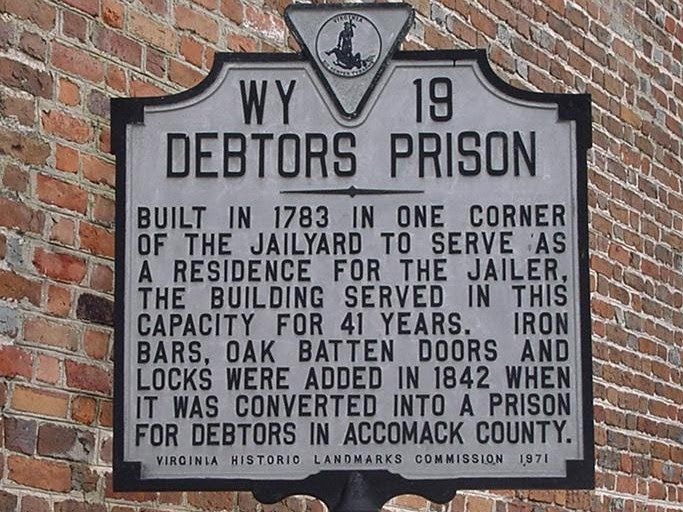So they taught you in school that there was no debtor’s prison in the great nation of the United States of America, did they? Well, of course, most school children know there’s no debtor’s prison here, but are they correct?
Debtors prisons are as old as humanity. The Bible deals with the idea in Matthew 18:23-35. In this biblical story, servant A is called before his king. Servant A owed a great deal of money to the king. The king ordered that Servant A be sold into slavery, with his wife and children also to be sold, all to pay the debt. Servant A begged and the king showed mercy, cancelling his debt. Later Servant A came across Servant B, who owed a small amount of money to Servant A. A grabbed B by the throat and yelled at him to pay what he owed. B begged A to have mercy and give additional time to pay. A had no compassion and had B thrown into debtor’s prison. As these stories go, A’s fellow servants ratted him out to the king and the king was very, very unhappy with A, calling him wicked and essentially telling him that his soul would burn in the eternal fires.
Debtor’s prison is not a fun place. Essentially, it’s a jail where you are placed until your debt is paid. Since you are in jail, you can’t pay your debt and someone must come to your aid, a benefactor or loved one. None of these in the U.S.A.?
As a bankruptcy attorney, I have been fond of telling people we don’t have debtor’s prison in our country. When I decided to do this article, I did some researched and was appalled to learn that I had been incorrect. Here’s what I learned:
According to the American Civil Liberties Union “Across the country, in the face of mounting budget deficits, states are more aggressively going after poor people who have already served their criminal sentences and jailing them for failing to pay their legal debts. These modern-day debtors’ prisons impose devastating human costs, waste taxpayer money and resources, undermine our criminal justice system, are racially skewed, and create a two-tiered system of justice.”
According to theWorld News Daily,
“The ACLU did a study in 2010 revealing the use of debtors prison practices in five states, Louisiana, Michigan, Ohio, Georgia and Washington. That led to a comprehensive study by the ACLU of Ohio, released just this month, on the widespread practice of jailing people for debt.”
What these articles, and other research, reveal is that the practice of sending people to jail for their past due charge card debt is not happening, but people can be, and are, sent to jail for contempt of court, only to be released upon the payment of certain debts. These include past due child support or alimony (11 U.S.C. § 523(a)(5)); fines, penalties and forfeitures payable to and for the benefit of a governmental unit (11 U.S.C. § 523(a)(7)); and orders of restitution under title 18, United States Code (11 U.S.C. § 523(a)(13)).
These are just some of the things that can wind you up in jail if you fail to pay them, and is not, by any means, an exhaustive list. The trick is usually that you are summoned to appear in court to explain why you have not paid the debt. Upon receipt of the summons you fail to appear, and a bench warrant is put out for your arrest. Typically you are arrested for the failure to appear, but often you are not released until the debt, or a portion of it, is paid. Its fairly common in Arizona, particularly amongst sheriff Joe’s officers, that people are picked up on warrants for failure to appear on child support or alimony issues, now referred to as domestic support obligations.
The rub is that if the debt falls within one of the exceptions to discharge set forth in 11 U.S.C. § 523, you may not be able to prevent a run in with the law by filing for bankruptcy relief. And although the debt might not be dischargeable in a chapter 7 bankruptcy, keep in mind that an excellent bankruptcy attorney may be able to restructure the non-dischargeable debt in a chapter 11, 12 or a chapter 13 plan, and get you protection through the use of the “automatic bankruptcy stay”.
So the next time some smart friend or neighbor tells you that you don’t have anything to worry about “because there is no debtor’s prison in the U.S.A.”, refer them to this blog so they may be educated.



